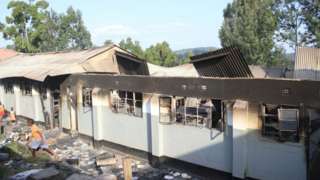Africa/Kenia/Junio de 2016/BBC
RESUMEN: Esta semana, se han producido otros cuatro incendios en las escuelas, y los informes de los medios dicen que ha habido al menos 16 incidentes de fuego en las escuelas en el oeste de Kenia este año, sobre todo alrededor de Kisii.
Los kenianos han estado debatiendo el tema en los medios sociales y los programas de radio. Algunos sugieren que se trata de una cuestión de indisciplina, causada por la mala crianza de los hijos, y que el apaleamiento debe ser presentada de nuevo.
Kenya prohibió el castigo corporal en el año 2001. Los expertos y los políticos también están estudiando el problema para ofrecer sus propias soluciones.
Los periódico Estándar de Kenia informan que los funcionarios de educación han identificado varias razones detrás de los disturbios de la escuela.
Por: Dickens Olewe
School arson attacks carried out by students appear to have become a trend in Kenya, leaving people to speculate about the causes, although no-one seems to agree.
Last Saturday’s incident, when dormitories were burned down at a boarding school in western Kenya, was one of many this year.
But it caught people’s attention as it appeared to be the result of anger that students were not allowed to watch a live broadcast of a Euro 2016 football match.
Many thought that there must be a more profound reason.
This week alone, there have been four other school fires, and media reports say there have been at least 16 fire incidents in schools in western Kenya this year, mostly around Kisii.
Kenyans have been debating the issue on social media and radio talk shows.
Some suggest that this is a matter of indiscipline, caused by poor parenting, and that caning should be reintroduced.
Kenya banned corporal punishment in 2001.
The experts and politicians are also looking into the issue and offering their own solutions.
Kenya’s Standard newspaper reports that education officials have identified several reasons behind the school unrest.
These include:
• students panicking about expected stricter supervision in national exams
• poor school leadership
• the imposition of stricter rules
• drug abuse.
There was also the suggestion that some teachers may have been involved in the planning of the attacks.
Kenya’s Education Minister Fred Matiang’i joined the chorus of people blaming parents for the indiscipline.
He said they should take responsibility for «instilling the right values» and prevent students from taking antisocial behaviour into schools.
On a visit to the school affected on Saturday, Mr Matiang’i said the parents of those behind the arson should pay for the damage.
Deputy President William Ruto proposed his own solutions, calling for student mentoring and more prayers in schools.
Meanwhile, some local education officials have blamed politicians for not being good role models.
‘Bad teacher training’
John Mugo, head of education charity Twaweza, believes the problem lies with poorly prepared teachers.
He told the BBC that indiscipline was the result of the absence of guidance to teachers on how to manage students’ behaviour.
«The government banned caning in schools and has failed to introduce alternative ways of dealing with indiscipline,» he added.
He also thinks that the ministry of education, school management and students are not properly communicating with each other.
As if to underline how serious and difficult the problem is, on Monday, hours after the education minister visited a school to talk about arson there was a fire in one of its dormitories.
Generation gap
The Nation newspaper reported that school officials blamed an electrical fault rather than student action.
Fires were also reported at two other schools on Wednesday but the causes are yet to be established.
As Kenyans mull over who or what to blame for the worrying and frequent cases of school fires, a Facebook post which has been widely shared suggests that there is a yawning generation gap that will never be bridged.
«The average high school student does not know what [Minister] Matiang’i looks like, and they don’t care… They wouldn’t listen to authority from Nairobi even if it came with a fire-breathing dragon.»
Foto: Students set fire to school dormitories at Itierio Boys High School on Saturday night
http://ichef.bbci.co.uk/news/872/cpsprodpb/C74F/production/_90132015_arsonkenya2.jpg
Fuente: http://www.bbc.com/news/world-africa-36651683






 Users Today : 18
Users Today : 18 Total Users : 35459924
Total Users : 35459924 Views Today : 22
Views Today : 22 Total views : 3418487
Total views : 3418487